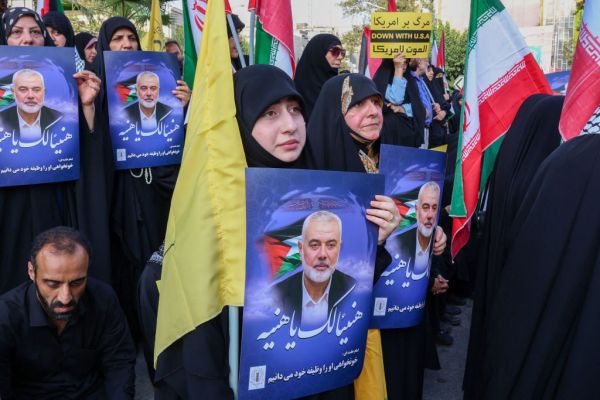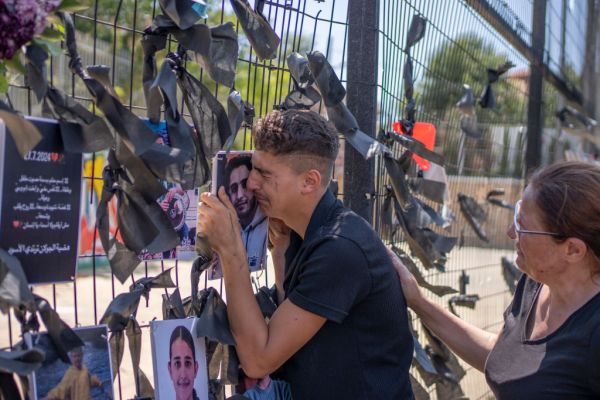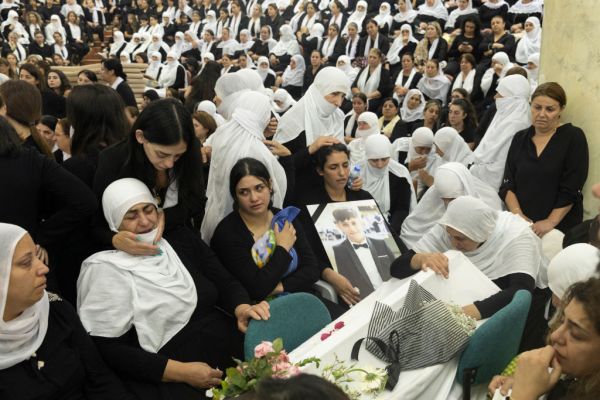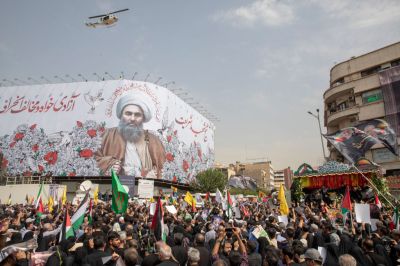Editor’s Note, August 1, 2024: We apologize for the delayed delivery of this newsletter, we are experiencing an issue with our email plug-in and are working to resolve it as soon as possible.
Happy Thursday! Winning a silver medal at the Olympics is cool, sure, but nowhere near as cool as being paid to hug giant wheels of parmesan cheese.
Quick Hits: Today’s Top Stories
- The Defense Department confirmed on Wednesday that three terrorists detained at Guantánamo Bay linked to the September 11, 2001, terrorist attacks—including an alleged planner of the attack—agreed to a plea deal with United States military prosecutors for lifetime imprisonment in order to avoid the death penalty. The details have yet to be finalized, but the trio—in the custody of U.S. authorities since 2003—are expected to plead guilty to all charges, including responsibility for the murder of 2,976 victims in the 9/11 terrorist attacks.
- Iranian Supreme Leader Ayatollah Ali Khamenei reportedly ordered a direct attack on Israel yesterday in retaliation for the fatal strike on Hamas leader Ismail Haniyeh that took place on Iranian soil early Wednesday morning. Though Haniyeh had been living in exile in Qatar, he traveled to Iran to attend the inauguration of Iran’s new president, Masoud Pezeshkian. “The criminal and terrorist Zionist regime martyred our beloved guest inside our house and made us mournful,” the ayatollah said. “It paved the way for a harsh punishment to be imposed on it.” Though the Israeli government does not usually confirm such actions, the Israel Defense Forces likely carried out the assassination. In an address on Wednesday that explicitly referenced an Israeli strike Tuesday that killed a high-level Hezbollah official in Lebanon, Israeli Prime Minister Benjamin Netanyahu generally warned that Israel was “prepared for any scenario.” Secretary of State Antony Blinken said Wednesday that the United States was “not aware of or involved in” the attack on Haniyeh.
- Israeli officials also announced this morning that Hamas military leader Mohammed Deif was killed in a July 13 airstrike in southern Gaza. Most analysts concluded immediately after the attack that Deif had perished, but Israel Defense Forces confirmed Thursday that was indeed the case. Deif had commanded Hamas’ military wing—the Al-Qassam Brigades—and was the second in command of the terrorist organization, one of the main planners of Hamas’ October 7 attack on Israel.
- The Treasury Department on Wednesday implemented sanctions on two individuals and four shipping companies connected to the Houthis in Yemen, targeting businesses and individuals who facilitated the shipment of military-grade supplies from China to the Houthis.
- The Associated Press reported Tuesday that Ukraine has received its first delivery of F-16 fighter planes from Western allies, and that U.S. military officials have trained the first class of Ukrainian pilots to fly the advanced fighter jets. While the number of jets included in the shipment was reportedly limited, more F-16 shipments—and trained pilots—are expected to follow.
- More than 50 English police officers were injured on Wednesday in what local law enforcement has called a “sustained and vicious attack” from right-wing rioters, including many associated with the anti-Islam English Defense League, who gathered in the coastal town of Southport, where three children were stabbed and killed at a Taylor Swift-themed dance class on Monday. Local officials have said the rioters—many of whom did not live in the town but traveled to the area—were motivated by inaccurate information circulating online about Monday’s knife attack, including a false name of the suspect currently detained and the incorrect suggestion that he was an asylum-seeker or in the U.K. illegally. According to the BBC, the unnamed 17-year-old suspect was born in the U.K., while his parents are from Rwanda. The rioters targeted a local mosque, pelting bricks at the building—and at police officers and vehicles parked in the mosque’s parking lot—in addition to setting police cars ablaze.
- The North African nation of Algeria withdrew its ambassador from France on Wednesday in response to French President Emmanuel Macron’s decision a day earlier to endorse Moroccan sovereignty over large domains in Western Sahara, a territory long contested by independence-seeking local Sahrawi groups supported by Algeria. France joined more than 28 other countries worldwide to support Moroccan control of Western Sahara—including the United States, which endorsed Morocco’s claim in 2020 in exchange for normalized relations with Israel.
- A Guinean court on Wednesday found the former president of the West African country and along with six other Guinean leaders guilty of crimes against humanity. Moussa Dadis Camara, who staged a coup in 2008, had been accused of commanding Guinean forces to massacre more than 150 protesters calling him to step down in the country’s capital of Conakry in 2009. Victims had asked that all of the defendants receive life sentences; Camara was sentenced to 20 years in prison.
- More than 150 people have died in southern India—and nearly 200 more are missing—after torrential rain storms caused a series of destructive landslides in recent days. Rescue operations were and continue to be conducted in India’s southern state of Kerala, but more than 1,000 emergency workers continue to face harsh weather conditions.
- The Federal Reserve on Wednesday held interest rates steady at their current target range of 5.25 to 5.5 percent, though the central bankers signaled a rate cut is possible as soon as September. “Overwhelmingly, the sense of the committee was [no rate cut] at this meeting, as soon as the next meeting, depending on how the data come in,” Fed Chair Jerome Powell said at a press conference. “And if we do get the data that we hope we get, then a reduction in the policy rate could be on the table in the September meeting.”
- The Department of the Interior released a report on Wednesday detailing mistreatment of Native American children in U.S.-funded boarding schools. The report examined 417 schools run by the federal government from 1871 to 1969, finding that at least 973 children died in that timeframe while attending the schools and calling on the federal government to formally apologize to native communities by creating a national monument remembering the children who died in residential schools and investing in efforts to revitalize native languages.
- Boeing’s board of directors on Wednesday named longtime aerospace engineer and executive Robert K. Ortberg as the company’s next president and CEO. He will succeed Dave Calhoun, who in March announced his decision to resign on August 8. Ortberg, 64, has more than 35 years of experience in the aerospace industry and will be tasked with repairing the company’s tattered public image following a series of incidents with its 737 Max commercial jets that led to a criminal settlement with the Justice Department last week.
Twin Strikes Kneecap Iranian Proxies and Embarrass Tehran

There’s perhaps no better example of a “pinpoint” strike than a missile hitting the exact room—in a multistory residential guest house operated by Iran’s Islamic Revolutionary Guard Corps in Tehran—where the head of Hamas, Ismail Haniyeh, was asleep in his bed. And there’s significant evidence that Israeli forces did just that at around 2 a.m. local time on Wednesday, not that they’ll ever admit it.
It was one of two high-profile assassinations in recent days after an Israel Defense Forces (IDF) strike earlier this week killed Fuad Shukr, senior Hezbollah commander, in Beirut, Lebanon. Israeli officials confirmed earlier this morning that a separate strike on July 13—targeting Hamas’ military leader Mohammad Deif—had successfully achieved its objective, killing one of the main architects of the terrorist group’s October 7 attacks.
All three strikes represent significant setbacks for the Iranian proxies threatening Israel—Hezbollah from Lebanon and Hamas from Gaza. Plus, the strike that killed Haniyeh marked one more in a string of embarrassing recent security failures for the Iranian regime. It remains to be seen exactly how Iran—or Hamas or Hezbollah—might retaliate against Israel, as what is already a multifront regional proxy war closes in on its tenth month and is once again at risk of escalating.
With the region on a knife’s edge, Israeli Prime Minister Benjamin Netanyahu didn’t mention Haniyeh’s death in Iran in an address to Israelis Wednesday, though Israel rarely confirms military actions in Iran. He did say that the Jewish state had in recent days landed “crushing blows” against Iranian proxies: the Houthis in Yemen, Hamas in Gaza, and Hezbollah in Lebanon.
On Tuesday, Israel struck southern Beirut, a Hezbollah stronghold, in retaliation for a Saturday rocket attack on a Druze village in northern Israel—just miles from the border with Lebanon—that killed 12 children playing on a soccer field. Israel’s retaliatory strike killed Shukr, one of Hezbollah’s top military commanders whom Netanyahu said was directly responsible for the northern Israel attack. “We settled our score with [Shukr], and we will settle our score with anyone who harms us,” he said. “Everyone who takes aim at our children, everyone who murders our citizens, everyone who harms our country—their blood is on their own head.”
Shukr also had American blood on his hands. The U.S. had a $5 million bounty on his head for his involvement in the 1983 Hezbollah attack on the Marine barracks in Beirut that killed 220 Marines, 18 sailors, and three soldiers. The U.S. reportedly had advance notice of the IDF’s strike on Tuesday.
But U.S. Secretary of State Antony Blinken claimed Wednesday that wasn’t true of the precision strike that killed Haniyeh on Wednesday morning in Tehran, telling reporters that “this is something we were not aware of or involved in.”
Haniyeh has surely been near the top of Israel’s hit list since Hamas’ October 7 attack that killed some 1,200 people and saw the terrorist organization abduct more than 200 others, about 100 of whom—including several American citizens—are still being held captive in Gaza. The political leader of Hamas, Haniyeh has been one of the main negotiators on the supposed ceasefire-for-hostage deal that the group has repeatedly stonewalled.
National Security Council spokesman John Kirby said Wednesday that it’s “too soon to know” how Haniyeh’s assassination will influence those talks. But it could put pressure on what remains of Hamas leadership—including Hamas’ leader in Gaza, Yahya Sinwar—that “this train is only going one way,” said former IDF spokesman Jonathan Conricus. “It either goes toward the fate of Ismail Haniyeh and [assassinated Hamas commander] Mohammed Deif, who are no longer going to be terrorizing anybody on this earth, or you do a deal, and [those are] the options that Hamas have currently.”
Haniyeh had lived in Qatar under the protection of the Gulf country for decades,
but remained connected to Hamas’ violent activities. “This is a man that would establish relationships with countries for support—not only symbolic support, but we’re talking financial support, we’re talking smuggling arms to assist the Al Qasem Brigades,” said Joe Truzman, senior research analyst at Foundation for Defense of Democracies who focuses on Iranian proxies, referring to Hamas’ military wing. “Haniyeh is no different than the terrorist in the battlefield right around the ground, or a terrorist with his finger on the trigger of an AK-47. … I don’t think there’s a firewall between the so-called political wing of Hamas and the military wing of Hamas—they’re one entity.”
Haniyeh’s most important patron was certainly Iran—Hamas’ primary backer—and he was in Tehran on Tuesday and Wednesday to kiss the ring during the inauguration of Iran’s new president, Masoud Pezeshkian. Just hours before a missile struck his bed, he was embracing Supreme Leader Ayatollah Ali Khamenei.
Even as it backs proxies launching deadly strikes across the region, Iran has repeatedly failed to maintain its internal security and protect its own commanders abroad. In the roughly 10 months since the October 7 attack, Iran has allowed a series of humiliating and catastrophic security failures: a deadly terror attack that killed more than 80 people on the four-year anniversary of the U.S. assassination of Islamic Revolutionary Guards Corps (IRGC) Quds Force commander Gen. Qassem Suleimani; a likely Israeli strike that took out three high-ranking IRGC commanders in Damascus, Syria, in April; an abortive and costly direct strike on Israel in retaliation; and an Israeli counter strike to that attack that hit a military base in Iran, which the country was powerless to stop. Likewise, Israel has steadily worked through a hit list of top commanders in Iran’s “Axis of Resistance”—proxies it uses to wage war against Israel and other Western assets in the region.
“They are very insecure about this,” Gabriel Noronha, a fellow at the Jewish Institute for National Security of America and former U.S. State Department official who worked on Iran issues, told TMD of the Iranian governing elite’s security failures. “It’s largely, though not exclusively, due to mismanagement, corruption within their intelligence systems, ineptitude, and then the fact that there’s a whole lot of grievance within the Iranian society, where you have a lot of Iranians willing to turn on the regime and rat them out.”
With more than 100 foreign emissaries in Tehran to witness the presidential inauguration, the latest incursion on Iranian sovereignty likely struck a nerve, Noronha suggested. Indeed, the New York Times reported on Wednesday that the supreme leader had already ordered the IRGC to launch a direct, retaliatory attack on Israeli territory.
It’s not clear when that strike may come, what it would look like, or whether Hezbollah—which now will likely want to retaliate for Shukr’s death—will be involved. Since October 7, Hezbollah has launched almost daily attacks on northern Israel forcing some 100,000 Israelis from their homes. Though the pace and severity of those attacks have picked up in recent months sparking fears Hezbollah would fully open a northern front, it’s yet to materialize.
If Hezbollah did decide to strike out on its own to retaliate for the death of its military leader, Truzman said it could come in the form of a strike on a city in Israel, such as Haifa or even Tel Aviv, to draw a parallel to the strike on Beirut.
But Noronha thinks Hezbollah may opt out of this particular tit-for-tat. “I don’t think Hezbollah has any interest in an all out war,” Noronha told TMD. “They declined to do so at the beginning of October last year, when it could have put Israel into a massive bind. They’ve [shown] no interest in doing so since then.”
If Iran struck Israel by itself, as it did in April, it’s unlikely that the strike could overcome Israeli air defenses, according to the analysts TMD spoke to. If Hezbollah and its arsenal of 150,000-200,000 rockets, missiles, and mortars joined Iran in a coordinated attack, the combined effort could potentially overcome Israel’s Iron Dome and other defense systems. But, it would be an almost sure ticket to a full-on regional conflagration that might even pull the U.S. into the mix in defense of Israel.
That outcome still seems unlikely. “I think the Iranians are still very conscious of escalating the crisis,” Greg Brew, an Iran analyst at the Eurasia Group, told TMD. “They’re very conscious of undertaking any action that will trigger a significant Israeli and, more importantly, a significant U.S. response. So even if there is a strike on Israel, I think it will be calibrated and scaled in such a way as to avoid increased escalatory pressure.”
Still, Netanyahu, in his televised address on Wednesday, seemed to be trying to prepare his country for the worst. “Citizens of Israel, challenging days lie ahead,” he said. “Since the strike in Beirut, there are threats sounding from all directions. We are prepared for any scenario and we will stand united and determined against any threat. Israel will exact a heavy price for any aggression against us from any arena.”
Worth Your Time
- “A politician designed in a lab to help Democrats win pivotal Rust Belt swing states would probably look a lot like Josh Shapiro,” Yair Rosenberg wrote Wednesday in The Atlantic, eviscerating the antisemitic push on the far-left to keep the Pennsylvania governor off the Democratic ticket. “Today, Shapiro is the only veep contender subject to an organized campaign to capsize his prospective nomination. Put together by hard-left congressional staffers and members of Democratic Socialists of America, among others, the push is ostensibly about Shapiro’s support for Israel. ‘Tell Kamala and the Democrats now,’ reads the site NoGenocideJosh.com, ‘say no to Genocide Josh Shapiro for Vice President.’ … But as its name implies, the “Genocide Josh” campaign is not about applying a single standard on Palestine to all VP contenders; it’s about applying them to one person, who just so happens to be the only Jew on the shortlist. And to make matters more absurd, Shapiro’s positions on Israel don’t come close to fitting the epithet.”
Presented Without Comment
Wall Street Journal: Delta CEO Says CrowdStrike Tech Outage Cost It $500 Million
Also Presented Without Comment
Former President Donald Trump at the National Association of Black Journalists convention on Wednesday, discussing Vice President Kamala Harris:
“I didn’t know she was black until a number of years ago when she happened to turn black. And now she wants to be known as black. So I don’t know—is she Indian or is she black? … She was Indian all the way and then all of a sudden she made a turn and she went—she became a black person.”
Also Also Presented Without Comment
New Jersey Globe: While on Trial [For Graft], [Democratic Sen. Bob] Menendez Stayed at Luxury N.Y. Hotel and Charged It to His Campaign Account
In the (Olympic) Zeitgeist
Home-field advantage—and a whole lot of Léon Marchand—must be giving the French a boost, but we still have the incomparable Katie Ledecky.

Toeing the Company Line
- In the newsletters: The Dispatch Politics team reported from Kamala Harris’ campaign rally in Georgia on the Democratic Party’s new energy, Jonah uses (🔒) “The Snake” poem to explain what happened with Donald Trump and the Heritage Foundation’s Project 2025, and Nick drew a comparison (🔒) between Harris’ “weird” taunt and Trumpian campaigning.
- On the podcasts: Jonah is joined by John Podhoretz on The Remnant to engage in some intellectual schadenfreude about the left’s antisemitism problem and more, and Sarah and David take on Biden’s Supreme Court reforms on Advisory Opinions.
- On the site: Charlotte takes stock of the situation in the Middle East, John reports on Biden’s Supreme Court overhaul proposal, and Anna explains the Olympic “ban” on athletes from Russia and Belarus.
Let Us Know
How do you think Iran will respond to the assassination on its soil?








Please note that we at The Dispatch hold ourselves, our work, and our commenters to a higher standard than other places on the internet. We welcome comments that foster genuine debate or discussion—including comments critical of us or our work—but responses that include ad hominem attacks on fellow Dispatch members or are intended to stoke fear and anger may be moderated.
With your membership, you only have the ability to comment on The Morning Dispatch articles. Consider upgrading to join the conversation everywhere.